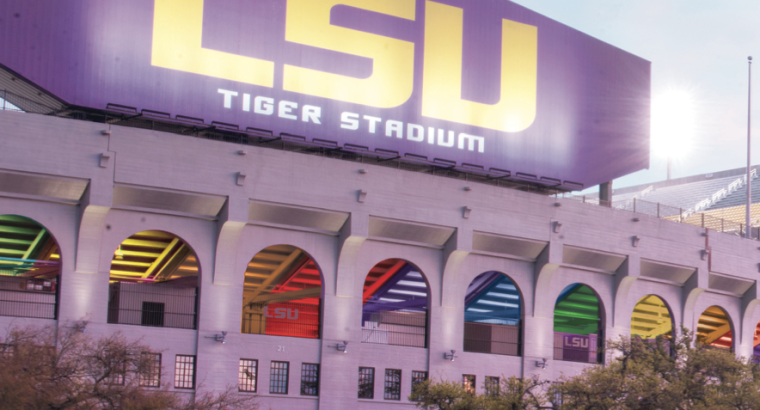Professional sports leagues across the country are preparing themselves for what seems to be inevitable: What happens when the country sees its first active, openly-gay athlete in a major sport?
Everything from desegregation, such as Jackie Robinson’s smashing of baseball’s color barrier, to centuries-old religious differences have found their way onto athletic fields throughout history. In one way or another, they have worked as proponents — or, in some instances, opponents — of change in society.
This generation’s conflict has taken shape in the form of equality for those who identify themselves as members of the LGBT community.
A football locker room has long been drenched in traditional masculine attitudes, making it a prime battleground for the same-sex equality movement.
“Football is supposed to be this violent sport — this aggressive sport that grown men are supposed to play,” said senior LSU running back Alfred Blue. “Ain’t no little boys out here between them lines. So if you gay, we look at you as a sissy. You know? Like, how you going to say you can do what we do and you want a man?”
A line has been drawn in the sand on the issue of openly gay athletes in football.
On one side stand those who see the sport through the same eyes as Blue — who could be expressing a common attitude among NCAA football players. The running back does not stand as the lone opponent to an era of change in football, as shown by San Francisco 49ers’ cornerback Chris Culliver, who made similar remarks only a few months back.
“I don’t do the gay guys, man. I don’t do that,” Culliver said during an interview at Super Bowl Media Day. “Ain’t got no gay people on the team. They gotta get up outta here if they do. Can’t be with that sweet stuff.”
On the other side are those who say it wouldn’t affect them. The You Can Play project — an organization that’s mission is to ensure “equality, respect and safety for all athletes, without regard to sexual orientation” — and its slogan, “If you can play, you can play,” have given the movement national attention. The NHL recently announced a partnership with You Can Play.
“College football is a business and you have to conduct yourself in a manner where you respect everyone you deal with,” said LSU sophomore offensive lineman Trai Turner. “I feel like if the person is gay, he must still conduct himself in the manner of a football player, and if a person isn’t gay, he must still look at the person who views himself as gay, or says he is gay, as his teammate.”
Turner acknowledged that there are people in college football who would be hesitant to accept an openly gay teammate. He said people are raised differently and hold varying beliefs, but added that personal beliefs should be left off the field, no matter what they are.
“Being gay won’t do nothing for you,” Turner said. “If I knew I was lining up in front of somebody that was gay, I’m going to pancake him and sit on him just like I would on anybody else.”
When asked how they would feel about having an openly gay teammate, most athletes continued to preach teamwork and brotherhood.
LSU sophomore quarterback Stephen Rivers summed up the attitude in just one sentence.
“If he can play for LSU, he will play for LSU,” Rivers said.
However, the notion of an openly gay football player brings with it a level of tension and anxiety among athletes — despite which side of the issue they are on.
The topic of openly gay athletes in football is so taboo, the LSU Athletic Department would not allow players to be asked questions on the topic before they were properly prepped for the interview.
LSU junior kicker James Hairston said the deeper issue is the respect people show to one another throughout their lives.
“I believe that this is an important issue, one that does need to come to the forefront, that does need to be talked about,” Hairston said. “But I think the main thing is people can learn as fans, as athletes, as just people in general, just respect one another and it ends at that.”
According to a Gallup poll done in 2012, approximately 3.4 percent of the American population identify themselves as members of the LGBT community.
Statistically, out of the 109 athletes currently on the LSU football roster, four of them could potentially be gay. However, the accuracy of that number can never be truly known due to the fear of a backlash or prejudice directed at their announcements.
Rivers said a major factor in why no active football player to date has come out may be the inevitable trash-talking and unwanted media attention he would receive by becoming what some are already calling the “Jackie Robinson of gay rights.”
“In today’s society, I think there would be something extra for the person lining up against that person,” Rivers said. “You get trash-talking whether you have those problems or not, and I could see that happening.”
Even if the number of openly gay athletes on the football team is zero at the moment — something Blue insisted was the case — the possibility still remains that a player may come out in the future and LSU coach Les Miles and his team will have to respond.
“I would handle it as what’s important and what’s best for the team,” Miles said. “I would treat him, and expect his teammates to treat him, in an appropriate and straightforward manner. … It would have to be something that I took to an office and kind of describe how I saw locker rooms and how I saw travel and how I saw staying in hotel rooms and how I saw those things. If that’s not an issue, I think things could be resolved.”





